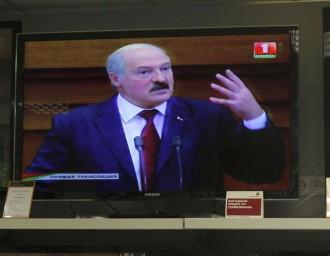Belarus: Media literacy vs propaganda

In Belarus, little over half of the population accepts state propaganda as truth. And it is quite foreseeable that the Belarusian state would like to keep it this way.
State media in Belarus are widely considered to be a part of ideological machine of the ruling regime, but still they enjoy a high level of trust from the audience. The latest survey by the Independent Institute of Social, Economic and Political Studies (IISEPS) shows 55% of Belarusians trust state media, while only 39 per cent say they trust independent media.
The reason for that is a traditional perception of media in post-Soviet society: everything said in an “official” paper or on TV is considered to be trustworthy.
“Belarus has a post-Soviet society that is characterised by non-critical attitude towards everything,” says Ales Antsipenka, a Belarusian philosopher and a media expert. “A bearer of ideological dogmas is required to be loyal to the authorities and totally take for granted messages mainstream ‘official’ media deliver, transmitting only one point of view — that of the regime.”
The “vertical model of communication” remains very strong in Belarusian society, where “top-down” information flows from the authorities to the population. In this model, the authorities that stay on top of the “information pyramid” and broadcast ideas that are supposed to be accepted as universal truth.
“This model is sustained through budget subsidies to state media, through ideological choice of people who manage those media outlets, through censorship and creation of ideological filters between sources of information and audience. On the other hand, there are independent media that are allowed to practise a critical attitude to reality”, Antsipenka says.
Increasing media literacy for Belarusians would help to improve the situation. The basis for media literacy should be a possibility to question, to analyse news reports in media, and to differentiate between propaganda, censorship and manipulation technologies. In this case, the media audience should become a competent member of the media process. But the Belarusian state does not want this to happen.
“The authorities of the country, on the contrary, rely on decreasing of cultural and educational levels, and a low level of media literacy is one of the main conditions of ideological and propaganda work among population,” say Ales Antsipenka.
The question is whether Belarusian media themselves are interested in their audience being able to differentiate a quality journalistic product from a poor one. According to Aliaksandr Klaskouski, a well-known Belarusian journalist and media expert, it is the media that aim to bring quality reporting to the public that are most interested in better media literacy of the audience.
“It is more useful for tabloids or ‘barricade media’ to have an indiscriminate reader. That is why, unfortunately, not many media outlets in Belarus are really interested in increase of the media literacy level of the audience,” Klaskouski admits.
“But propaganda media outlets, both state and oppositional, should be left aside when we speak of journalism and mass media,” Eduard Melnikau, a professor of European Humanities University, argues. “Otherwise, every ‘real’ media outlet should be interested in its audience having a good level of media literacy, because an educated reader can increase the effectiveness of media themselves as they become partners and co-authors.”
This can only be achieved if the society understands how valuable quality journalism is. But this, in turn, is impossible without changing of the system of values — a process that can take years.
“It is quite easy to change public opinion; it does not take too long. But changing the system of values in society is a much more complicated and long process. If we speak of quality journalism, it is a product that is needed by people whose set of values changed from old Soviet to new, European ones,” says Ales Antsipenka.
At the same time, professor Melnikau is sure it is impossible just to wait for the rest of the society to change their values system.
“Media literacy is needed today, and it is needed to everybody, from politicians to street cleaners, because media is the instrument of pushing the society towards humanitarian values; without these values no developments of economy, science, culture are possible,” argues Eduard Melnikau.
But it is clear the Belarusian state is not interested in media literacy of its citizens, and the society itself does not value quality journalism. So, the question is who should take the responsibility for media education of the audience? The obvious answer is media outlets themselves. But nowadays many of them are quite marginalised or operate in semi-clandestine conditions, and rarely work effectively with their audiences. Non-governmental organisations often fail to work with the society as well, as many of them concentrate on holding on to their structures and actual “survival” in difficult authoritarian conditions.
Journalistic organisations such as the Belarusian Association of Journalists should be working in the field of media literacy. But the question is whether they will be allowed to access schoolchildren and students, who should become the main target audience for such programmes. The state holds the line of defence and substitute classes in media literacy with lessons in “political information”.
-
03.01
-
07.10
-
22.09
-
17.08
-
12.08
-
30.09



























